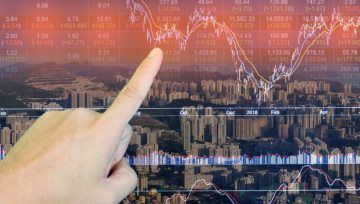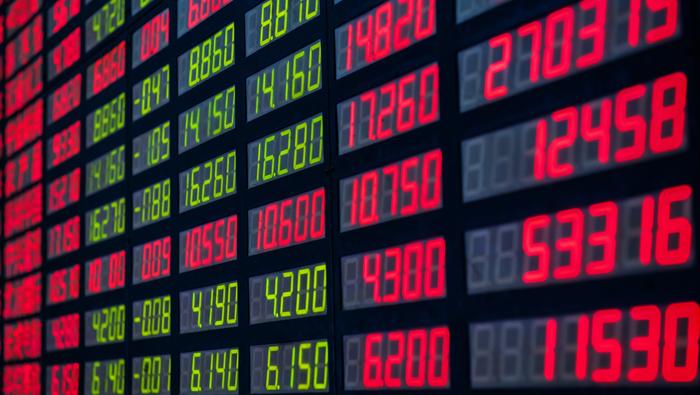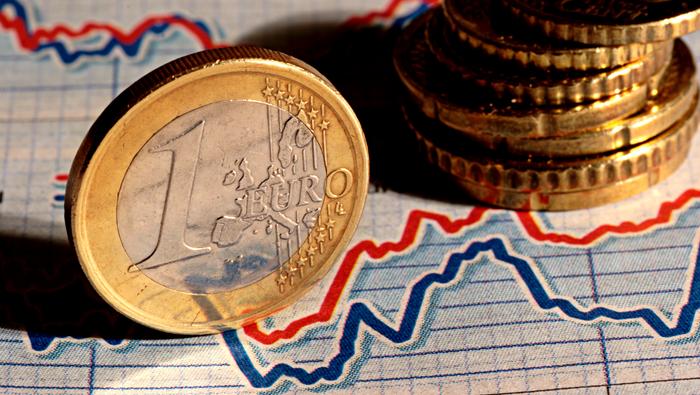TRADING BLACK SWANS
- A so-called black swan event is improbable, unpredictable and catastrophic
- Russia’s invasion of Ukraine is a black swan event
- A new options trading book by tastytrade’s Julia Spina offers ideas on trading black swan events
The Unlucky Investors Guide to Options Trading, ironically, eschews luck. “When you walk into a casino, the only way you’ll walk away with more than you started with, or even the same amount for that matter, is if you get lucky. The house has the statistical edge for every game. They’re not relying on luck. It’s the players who are relying on luck. What options allow traders to do is to build strategies with a statistical edge so, like the casino, they no longer have to rely on luck to succeed in the long term,” says book author Julia Spina, a tastytrade podcast host and research analyst.

The book, which has a forward by Tom Sosnoff, debuted Feb. 23. It offers retail traders everything from the fundamentals of options to building customized strategies according to quantitative reasoning, rather than relying on luck.
As it launched, the world watched a black swan event unfold.
The Russian invasion of Ukraine is now verging on its third week. What began on February 20 as a “special military operation” has mushroomed into a full-scale invasion. The conflict appears poised to continue for the foreseeable future – perhaps weeks and months.
The ramifications of the Russian invasion of Ukraine are being felt throughout global financial markets. Bonds, commodities, crypto, FX, and stocks have all seen seismic moves in recent days.



We talked with the book’s author Spina about what options traders should know about black swan events, and other developments and ideas that shape options trading and investing. Highlights follow.
DFX: Former Wall Street trader and author Nassim Nicholas Taleb popularized the term “black swan” event –how do you see them impacting options traders?
Julia Spina: The way we approach black swan events in the book and how I see them personally, is that they are inevitable and unpredictable. If we assume that black swan events are going to happen, and if we assume they are unpredictable, options traders need to always account for this risk when trading, even if these events are highly unlikely. We keep position sizes small such that when a black swan event does happen, the potential impact on our portfolio is minimized. Once the black swan event occurs, and volatility is high, that’s when premium sellers and options traders can effectively capitalize on those conditions.
Historically, the outlier risk for options traders actually tends to be higher when market volatility is low and conditions are stable. This is because large losses are driven by unexpected periods of market volatility, rather than large price moves once volatility is already elevated. This is why high market volatility actually tends to be preferable for short premium traders. During these high volatility periods, premium prices can be significantly higher, and option prices can be significantly higher; when you sell option contracts in a high volatility conditions, then you can also collect significantly more capital.
DFX: Do you see Russia’s invasion of Ukraine as a black swan event?
JS: For sure. We can see from the volatility across the market that investors weren’t expecting this conflict. It’s almost exactly two years from when the COVID pandemic shook markets in the 2020 selloff.
DFX: That started in March 2020 when the S&P 500 plummeted by 34% over a few weeks, and other indices swooned?
JS: Nobody really saw it coming. There were early talks about a pandemic in China. When the pandemic reached the U.S., the VIX spiked from 15 to its all-time high (over 80) in less than a month. The impact on markets was unprecedented A lot of premium sellers got hurt during that volatility expansion because they were overexposed when market volatility was low and relatively stable. It’s an example of when we're talking about trading options, keeping position sizes small relative to your account size is the most effective way that you can mitigate a black swan event.
DFX: Volatility, as measured by the VIX Index, has been extreme in recent weeks – is that a reliable gauge of where the market is going?
JS: The VIX is around the 34 handle. It could have gone 80, it could have gone to 60, even 120. Even though we can anticipate changes in the market because of geopolitical events, we can't consistently predict what's going to happen. The market responded much differently to the Russia-Ukraine conflict than they did to the COVID pandemic, for example. The VIX could continue to increase and reach new highs as a result of this conflict and the sanctions, or peace could be reached tomorrow. There’s no consistent way to predict the future, and investors can protect themselves from that uncertainty by maintaining a well-diversified portfolio and minimizing concentration in a particular company, sector or market.
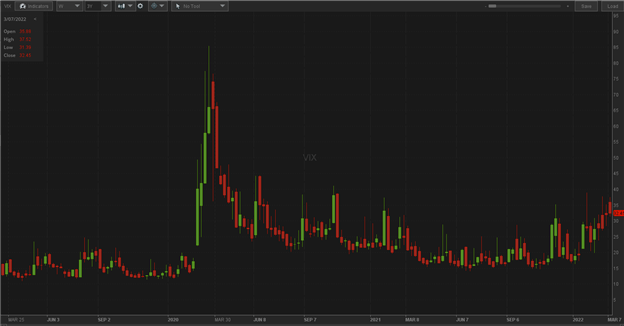
VIX Chart as of 3/9/22; source: tastyworks
DFX: What’s the next black swan?
JS: This is a highly personal take, but if I had to guess, I think that this specific occurrence—Russia’s invasion of Ukraine-- is going to be a much longer-term event compared to, say, the 2020 sell off, which only lasted for a month or two. It’s because Russia is so tied into commodities, and the major global economies, many of which are now sanctioning Russian commodities, and dealing with some form of inflation.
Given Russia’s role as a major exporter of oil, natural gas, wheat, and industrial metals, I could only see making this experience of inflation significantly worse, which could have longer term consequences on global economies.
DFX: You came to options trading in an unusual way—talk about experiences that prepared you to understand improbable, unpredictable and catastrophic events, and to trade on them
JS: My first exposure to trading was through video games, in 6th or 7th grade. There’s a game called Runescape and around 2007, they added the Grand Exchange where you could buy and sell items. The price dynamics of these items moved almost exactly like a stock price. You could buy low, sell high, put in limit orders.
DFX: Runescape is the fantasy game organized around Medieval kingdoms, regions and cities with economies, wars and other catastrophes?
JS: Yes. The game developers would slow an item’s circulation in the economy, and its prices would increase. Or they would saturate the game with a particular item and its price would crash. It was shockingly similar to financial markets when there are geopolitical tensions around events such as elections. You don't have options in Runescape, obviously, and that's what makes financial markets different, but also way more interesting. Instead of trading the direction of the price or the item itself, you're actually trading insurance on that item.
DFX: How did you go from playing video games as a teen to trading options?
I had an interest in trading from a young age, but I didn't actually pursue those interests until I was older. When I went to college and studied physics, math and computer science, I really learned how many of those concepts have very broad applicability, particularly when you understand how to analyze data. If you know where your data comes from and if you understand how to analyze and interpret it properly, then you don't need to be an expert in the given field to be able to draw conclusions from it. Once I understood that concept and started experimenting with financial data and signals, I was drawn to it almost immediately.
I was drawn to options because they have a lot of strategic capacity. When you buy a stock, the stock will either go up or down, you don't really have much control over that probability distribution, over that risk-reward profile. With options, you have much more control over the probability distribution of the trade. You can make money whether the underlying price increases, decreases or stays within a neutral range.
DFX: What kind of role models inspired you along the way?
JS: I've worked in male-dominated industries for my entire career - female colleagues have been hard to come by and female role models have been even more scarce. I've noticed that the chronic lack of female participation in certain fields (physics, engineering, finance, etc...) often deters women from pursuing those fields, not because of a lack intelligence or motivation, but rather because of a lack of relatability. Many of us had a teacher, historical figure, author, content creator, or online community that inspired us to pursue a discipline more deeply because of a personal connection. It's difficult to develop an interest in a field if you can't relate to anyone in it. Trading is competitive, it's strategic - I think a lot more women would be interested in trading if they found people they identified with. The Internet is allowing the very small number of women in finance to share their thoughts and expertise and to reach other women like never before. I'm very optimistic that these emerging figures will inspire more women to engage with the market and take control of their own finances.
DFX: Any tips for women traders or anyone interested in options in this volatile environment?
1. Use small positions: For people thinking about trying options, it's exceptionally important to keep position sizes small. Options are leveraged instruments so their swings are a lot more dramatic than a non-leveraged position; however, leverage is actually really powerful if you know how to use it. For instance, you can get the same risk reward exposure as a stock position with a lot less capital. However, the drawback is that you need to be very mindful of position size and the potential risk of a position.
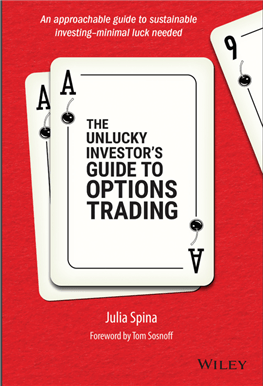
2. Pick a strategy that matches the market environment: Understand the risk of a position before you start trading. The “right” strategy really depends on the individual, but one strategy that can be suitable for this type of market is an iron condor. It is a directionally neutral, defined risk strategy that profits from the underlying trading in a range, through the expiration of the options contract. It’s made up of a short vertical put spread and a short vertical call spread in a single transaction, in the same expiration. It’s a defined risk strategy and you know the potential loss of a position before you get into it.
3. Options beginners should stay away from stocks: If you're just starting out, stay away from stocks. Instead, stick with ETF's that are well diversified, assets that are a lot less sensitive to sector and company specific factors. Examples including SPY, GLD or TLT. Less expensive ETFs, such as SLV or GDX, may be better suited for smaller accounts. Any of these ETF's are generally a lot less volatile than investing in say, Facebook, GME or Tesla.
Read more about women in finance and options traders.




